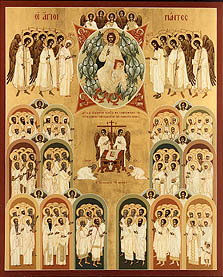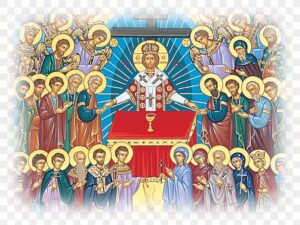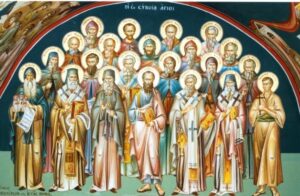Who is a saint? Who is a Saint?

A Saint is one in whom Christ lives, one who opens his life to Christ and lives as, Christ wills him to live. Saints are those, who exemplary spiritual lives, deeds, and works, with an exceptional degree of holiness, likeness, or closeness to God, keeping the commandments of Christ. They inspired and continue to inspire the spiritual lives of the faithful to this day. Saints are those who by their active faith and love, have become like God and show forth the image of God in its power, those who have obtained for themselves abundant grace, those who, having advanced closer to the goal of Theosis. A Saint is one who has been made actually what Baptism declares him to be, one set apart for God. These are Saints with a capital ‘S’ those officially canonized by the Church. “It is no longer I who lives, but Christ lives in me”.
Saint/saints – derived from the Latin sanctus, which means ‘holy’ and the Greek equivalent is Hagios – holy.

There are saints with a small ‘s’ – all baptized and committed Christians, made in the image of God and baptized in the Holy Trinity, every Christian has the potential of sainthood and is called by God to be a saint. These men and women were ones “called to be saints.” They were called by the gospel to acknowledge Jesus as the Christ and submit to His will (2 Thess. 2: 13-14), chosen by God, called through the gospel of Christ, to be saved through the sanctifying work of the Spirit and through belief in the truth and share in the glory of our Lord Jesus Christ. These holy people, Lord’s People, God’s people, holy ones,heard, believed and were baptized (Acts 18: 1, 8).
Thus, St. Paul, writing to the Churches he had visited, calls all the faithful “saints.” Writing to the them, he addresses “the saints who live in Rome (1: 7); Ephesus (1:1); Corinth (1 Cor, 1: 2, 2 Cor. 1:11); Philippi (1: 1)
Matt 27: 52: – 52 The tombs also were opened, and many bodies of the saints who had fallen asleep were raised. They came out of the tombs after Jesus’ resurrection andwent into the holy city (Jerusalem) and appeared to many people.
Acts 9: 13 – But Ananias answered, “Lord, I have heard from many about this man, how much evil he has done to thy saints at Jerusalem;
Acts 9: 32: – 32 Now as Peter went here and there among all the believers, he came down also to the saints living in Lydda.
Acts 9: 41 – 41And he gave her his hand and lifted her up. Then calling the saints and widows he presented her alive.
Acts 26: 10 – 10And I did so in Jerusalem; I not only shut up many of the saints in prison, by authority from the chief priests, but when they were put to death, I cast my vote against them.
Rom. 1: 7: – 7 To all God’s beloved in Rome, who are called to be saints; Grace to you and peace from God our Father and the Lord Jesus Christ.
1 Cor. 1: 2: – 2 To the Church of God that is in Corinth, to those who are sanctified in Christ Jesus, called to be saints, together with all those who in every place call on the name of our Lord Jesus Christ.
Eph. 1: 15: 15 I have heard of your faith in the Lord Jesus and your love towards all the saints, …………
Philipp. 1: 1: 1 Paul and Timothy, servants of Christ Jesus, to all the saints in Christ Jesus who are in Philippi, with the bishops and deacons;
1 Thessalonians 3:13: 13 To the end He may establish your hearts unblameable in holiness before God, even our Father, at the coming of our Lord Jesus with all His saints.
There are many Old Testament references for the saints – 2 Chron. 6: 41, Psalm 16: 3, 30: 4, 31: 23, 34: 9, 37: 28, 79:2, 85:8, 97:10, 116:15, 132: 9, 16; 145:10, 148:14, Proverbs 2: 8; Daniel 7: 18, 21, 22, 25, 27, 8:24; Tobit 8: 15; Wisdom 5: 5, 18: 9; 1 Maccabees 7: 17.

The only true Holy One (Hagios) is Trinitarian God Himself. The Holy Bible specifies “For I am the Lord your God; you shall name yourselves holy and keep yourselves holy, because I am holy … “ (Lev. 11: 44; 19: 2 and 20: 7). Man becomes ‘holy’ and ‘sainted’ by participation in the holiness of God. Holiness or sainthood is a gift (charisma) or grace, given by God to man, through the Holy Spirit. Through the work of the Holy Trinity all Christians could be called saints; especially as long as they were baptized in the name of the Holy Trinity, they received the Seal of the Spirit in Chrismation and frequently participated in the Holy Eucharist. In this context ‘we are all saints. Every Christian is called to be a saint: Christ commanded us to perfect as our heavenly Father is perfect (Matt 5: 48). Thus, they were set apart, sanctified, in Christ Jesus and can help the rest of us through their example and prayers.
The one thing that sets the Saints apart from the rest of us, saints is their struggle to remain entirely obedient to Christ. There is no bargaining in their mind, no negotiating Christ’s teaching, no diluting His words to the point where they lose the strength to open for us the path of salvation. They are filled with the Life and Love of God. They cooperated with God in doing His will & allowed the Holy Spirit to fill & use them. The saints worked hard to achieve that spiritual perfection, through their great spiritual exercises: – prayer, fasting, abstinence, repentance, receiving the Holy Mysteries (sacraments); living simple lives, humility, love, patience, purity and obedience; Bible reading, ……..
Most especially, by allowing God’s love to overflow through them to all creation. They truly lived a Transfigured, Transformed & Resurrected life to which we are all called, and who open their life to Christ. They live for Christ, they live with Christ, they live like Christ, they live in Christ and Christ lives in them
Most of us receive the word of God with awe and fear, but and we immediately start turning and twisting the commandments on all sides until we reach a compromise that suits for us. We truly want is something that looks like His word enough to make us feel good about ourselves, enough to make us have the appearance of Christians, but not to the extent that we could lose control over our lives. One can go through life either in obedience to Christ or in obedience to one’s own will. The challenges and choices of this world are simple and clear if we obey Christ’s word – we need to love, we need to forgive, we need to help. Ultimately, we need to allow the world to crucify us for His name and become true followers of the Crucified One.

Things only seem complicated when we begin negotiating Christ’s word, looking for a human version of it, which does not lead to the Cross. Unfortunately, we always succeed, and reduce Christ’s teaching to something that excludes the Cross. This poses the danger, that without the Cross there can be no Resurrection either. The Saints are not like that. They obey the Word of God and lead a life as Christ desires. The Saints do not build an idol of their earthly lives. They have no vision of a perfect life here, no vision of a perfect self in this world. They remain faithful to Christ and His word, and allow nothing of this world to come between them and their God.
‘Saint is like a ‘stained glass’. ‘Saints’ are those who allow the Light of Christ, to pass through them. A ray of light enables us to see the dust that is in the air. In the same way, lives of Saints show the defects in our life. If we fail to see our faults, it is because we have not looked at the lives of holy men and women.” ~ St Anthony
There are several categories of saints: prophets, apostles, evangelists, martyrs, ascetics, holy bishops and priests… They have lived or live a righteous life “in the world.” Many Orthodox theologians classify the Saints in six major categories:
- The Prophets, because they predicted and prophesied the coming of the Messiah.
- The Apostles who were the first ones to commissioned to preach and spread the message of the Gospel of the Incarnation of the Word of God and of salvation through Christ.
- The Martyrs, (Confessors) for sacrificing their lives for Christ and fearlessly confessing Jesus Christ as the Son of God and the Savior of mankind.
- The Fathers, Doctors and Hierarchs of the Church, who excelled in explaining and in defending, by word and deed, the Christian faith and for their theological acumen and courage in proclaiming the truth in the face of heresies.
- The Monastics, (Ascetics), who lived in the desert and dedicated themselves to spiritual exercise (askesis), reaching, a close, perfection in Christ, for their quality of life and the intensity of their prayer.
- The Just, those who lived in the world, leading exemplary lives as clergy or laity with their families, becoming examples for imitation in society.
- In the Orthodox Church, there is a category of a patron saint is regarded as the intercessor and advocate in heaven of a nation, place, craft, activity, class, place, country or person.
Are we a saint or can we be called as a saint?
Three times in the Book of Leviticus (Ch 11: 45, 19: 2 and 20: 26) God tells us ‘Be holy, because I am Holy’. Be perfect, therefore, as your heavenly Father is perfect. St Peter reiterates this commandment in the New Testament, challenging us to obey God’s commandments and submit our will to His will (1 Pet 1: 16). We too must consecrate ourselves, for we are His people. Everyone is challenged to manifest holiness in their lives & must become saints! We all have the common call – holiness of life. This is a common calling from God for saints and Saints. It is not reserved for the clergy, monastics……. or those who are more pious. Everyone who has been baptized into Christ must live in such a way that Christ lives within us. St Paul tells, “that you are God’s temple and that God’s Spirit dwells in you?” (1 Cor 3: 16).

The saints are like the Lord, but so are all people who keep the commandments of Christ; but those who live according to their own passions and do not repent are like the devil. I think that if this mystery were revealed to the world, then they would stop serving the devil, and every one would strive to serve the Lord with all his strength, and to be like Him. ~ (St. Silouan the Athonite, Writings, XII.9)
0 Comments